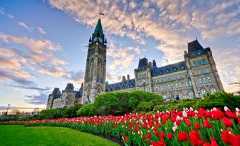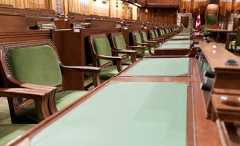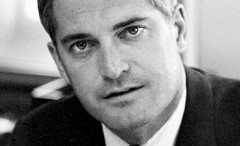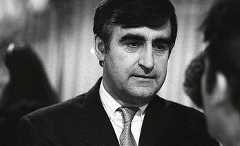- MLA 8TH EDITION
- Hillmer, Norman and Andrew McIntosh. "Brian Mulroney".The Canadian Encyclopedia, 05 February 2025,Historica Canada. thecanadianencyclopedia.ca/en/article/brian-mulroney. Accessed 26 October 2025.
- Copy
- APA 6TH EDITION
- Hillmer, N., & McIntosh, A. (2025). Brian Mulroney. InThe Canadian Encyclopedia. Retrieved from https://thecanadianencyclopedia.ca/en/article/brian-mulroney
- Copy
- CHICAGO 17TH EDITION
- Hillmer, Norman , and Andrew McIntosh. "Brian Mulroney."The Canadian Encyclopedia. Historica Canada. Article published April 22, 2013; Last Edited February 05, 2025.
- Copy
- TURABIAN 8TH EDITION
- The Canadian Encyclopedia, s.v. "Brian Mulroney," by Norman Hillmer, and Andrew McIntosh, Accessed October 26, 2025, https://thecanadianencyclopedia.ca/en/article/brian-mulroney
- Copy
Thank you for your submission
Our team will be reviewing your submission
and get back to you with any further questions.
Thanks for contributing to The Canadian Encyclopedia.
CloseArticle
Brian Mulroney
Article byNorman Hillmer,Andrew McIntosh
Published Online April 22, 2013
Last Edited February 5, 2025
Martin Brian Mulroney,PC,CC,GOQ,lawyer, businessman, politician, prime minister of Canada 1984–93 (born 20 March 1939 inBaie-Comeau,QC; died 29 February 2024 in Palm Beach, Florida, USA). One of Canada’s most consequentialprime ministers,formerProgressive Conservative Party leader Brian Mulroney helped hisparty winthe most seats ever (211) in the 1984 federal election. He signed a landmarkfree trade deal with the United States and Mexico (NAFTA)and oversaw passage of the initially deeply unpopularGoods and Services Tax (GST). He also spent much political capital trying unsuccessfully toreach an agreement that would seeQuebec sign theConstitution. TheCanadian Press Newsmaker of the Year in1983, 1984 and 1991, Mulroney took a strong stance against apartheid and made great strides in protecting theenvironment. But his historically low popularity led to anunprecedented defeat in 1993. By the time of his death, his measures, once labelled controversial, were largely seen by leaders of all parties as essential to Canada’s progress domestically and on the world stage.

Education and Early Life
Brian Mulroney was born and raised inBaie-Comeau, Quebec. He was the third of six children and the oldest son ofIrishimmigrant parents Benedict and Mary Irene (née O'Shea) Mulroney. His father, an electrician at the localpaper mill, was anxious that his children escape their smalltown. (See alsoResource Towns in Canada.)
Mulroney was sent to the private St. Thomas High School inChatham,New Brunswick. Hethen attendedSt. Francis Xavier University inAntigonish,Nova Scotia.He studiedpolitical science and joined the campusConservative club.He was also prime minister in the Combined Atlantic Universities Parliament.
Smooth beyond his years, fluentlybilingual and gregarious, Mulroney worked forJohn Diefenbaker’ssuccessful leadership campaign in 1956 before graduating in 1959. He became close with Diefenbaker and advised him on youth issues and Quebec. Mulroney then spent a year studying law atDalhousie UniversityinHalifax, where he worked for Nova ScotiapremierRobert Stanfield’s1960 re-election campaign. Mulroney then returned toQuebec. He earned a law degree fromUniversité Lavalin 1964.
Lawyer and Businessman
Brian Mulroney joined a majorMontreal law firm, Ogilvy Renault (now Norton Rose Fulbright), after law school. He soon specialized inlabour negotiations forbusinesses such asIron Ore Company of Canada andPower Corporation of Canada.After his father died in 1965, Mulroney took on heavy family responsibilities.
In 1974–75 Mulroney won public attention as an articulate and hard-hitting member of the Cliche Commission. It looked into violence and corruption in theconstruction industry inQuebec. By now, he was the leadingConservative organizer and fundraiser in the province.Despite never having run for political office, he was a strong candidate for the leadership of the federal party in 1976. He was defeated on the third ballot.
Mulroney became vice president of Iron Ore Company in 1976. As president (1977–83), he emphasizedlabour relations. At the end of his term, he closed the company’s operationinSchefferville, Quebec, without serious political fallout.
Mulroney again ran for theProgressive Conservative leadership in 1983. It was a low-key effort, due to charges that his 1976 campaign had been too slick andshowy. He beat formerprime ministerJoe Clark by 259 votes on the fourth ballot: 1,584votes to 1,325.
Leader of the Opposition
Mulroney was electedMember of Parliament (MP) for the safe Conservative riding of Central Nova in Nova Scotia in 1983. Asleader of the Opposition,he proved a skillful manager. He focused on healing party wounds and building a solidelectoral machine. Moderate and conciliatory by nature, he called for a stronger privatesector and less government intervention in the economy. He also sought minority French-language rights and closerCanadian-American andfederal-provincialrelations.
In the general election of 1984, Mulroney ran an almost flawless campaign againstPrime MinisterJohn Turner’sLiberals. His criticism of Turner’spatronage appointments for loyalists of former prime ministerPierre Trudeau — “You had an option, sir” — is regarded as one of the most decisive blows ever in a federal leaders’ debate. Mulroney won his home riding of Manicouaganwhile the PCs won 211 seats overall — the most in Canadian history.
Mulroney had always emphasized the importance ofQuebec to theConservatives, andin the election, made the risky decision to switch ridings to run in the one that included his Quebec hometown of Baie-Comeau. His pledge to bring Quebec into theConstitution“with honour and enthusiasm” persuaded manyQuebec nationalists to support the PCs. The party won 58 seats in the province — including his own —compared to only one in 1980. It was the breakthrough that Mulroney had promised. He was sworn in as Canada’s 18thprime minister on 17 September 1984.
First Term as Prime Minister (1984–88)
The first two years of Mulroney’s government were often marked by indecision and scandals in hisCabinet. However, his natural talent for building relationships was evidentearly on. He and US president Ronald Reagan became steadfast friends after Mulroney serenaded Reagan with “When Irish Eyes are Smiling” during his visit toQuebec City on 17March 1985 (the famous “Shamrock Summit”).
Mulroney was extremely active in foreign policy. Coming to power at the height of theCold War, he was internationally recognized as part of a transformative group of global leadersthat included Reagan, Thatcher, Mikhail Gorbachev, George H.W. Bush, François Mitterrand and Helmut Kohl.
In contrast to Reagan and British Prime Minister Margaret Thatcher, Mulroney took a strong stand against apartheid in South Africa. He backedCommonwealth sanctions against SouthAfrica with a stirring speech at theUnited Nations in 1986. He is often credited with helping to end apartheid and to free Nelson Mandela. Shortly after Mandela was releasedfrom a South African prison in 1990, the anti-apartheid activist publicly thanked Canada for its support. (SeeNelson Mandela: A Soft Spot for Canada.)

By the spring of 1987, Mulroney had launched the two main initiatives that would mark his first term: the negotiation of theMeech Lake Accord;and the conclusion of a Free Trade Agreement (FTA) with the United States. (See alsoFree Trade.) The FTA was signedin October 1987, largely due to Mulroney’s determination to get the deal done. With the deadline to sign the agreement about to expire, Mulroney called Reagan and asked him why the US could sign an arms treaty with its biggest enemy, the USSR, but nota trade deal with its closest ally. The deal was signed within the hour.
The FTA became the central issue in the bitterly contested1988 federal election. TheConservatives overcamea resurgentLiberal Party, around whom opposition to the FTA had coalesced. Mulroney became the first Canadian prime minister in more than 30 years to win back-to-backmajority governments.
Second Term as Prime Minister (1988–93)
After Brian Mulroney won a second term, his signature policy, theMeech Lake Accord, slowly unravelled. Its collapse in June 1990 was at least partly due to Mulroney’s widelyquoted “roll of the dice” in scheduling the lastfirst ministers conference so close to the deadline. (See alsoThe Death of the Meech Lake Accord.)As theCBC reported at the time, “The perception that he gambled with the future of the country… may have awakened what Tory pollsters know is a latentmistrust for Mulroney in public opinion.”
The Meech Lake Accord fractured Mulroney’s coalition of Western conservatives andQuebec nationalists. The former resented the special status granted toQuebec as a “distinct society” and turned their attention toPreston Manning’s nascentReform Party.For the latter, the collapse of Meech Lake was as close to an apocalyptic event as can be imagined in peacetime.Lucien Bouchard, Mulroney’s Quebec lieutenant and close friendsince law school, defected from the PCs and formed theBloc Québécois. The two men did not speak again until they quietly reconciled in the year before Mulroney’s death.
Mulroney’s government reached a new low in popularity with the imposition of the newGoods and Services Tax (GST). It went into effect on 1 January 1991. ButMulroney was only able to pass the GST into law by using an obscure emergency clause in theConstitution to add eight new senators. This gave the PCs theSenatemajority needed to pass the bill. Mulroney was widely criticized for engaging in the same kind ofpatronage and corrupt political favours that he had once railed against.
Between 1997 and 1991, the Mulroney government introduced a series of tax reforms, privatized more than 20Crown corporations, and deregulated thetransportation,telecommunications,financial services, andenergyindustries. Critics blamed the severity of therecession in the early 1990s on the FTA, which went into effect on 1 January 1989. But the Conservatives continued their policy ofopen trade. They negotiated theNorth American Free Trade Agreement (NAFTA), which this time included Mexico.
Mulroney also took strong measures to protect the environment. In 1991, he negotiated the Acid Rain Accord with the United States. This air quality agreement significantly reducedacid rain levelsand sulfur dioxide emissions. (See alsoAir Pollution.) While prime minister, he also passed theEnvironmental Protection Act (1988) and created eight newnational parks.
Having made national reconciliation his raison d’etre, Mulroney tried once more to gain Quebec’s signature to the Constitution with theCharlottetown Accord in thefall of 1992. (SeeCharlottetown Accord: Document.) Mulroney managed to gain the support of all 10 provinces and could have legally enactedthe amendment. But, still stinging from accusations that Meech Lake had been a backroom deal, he opted instead to put the Accord to a binding nationalreferendum. On 26 October1992, 54.3 per cent of the country voted against it.
Retirement from Politics
In November 1992, Brian Mulroney’s popularity was a mere 12 per cent — the lowest of anyprime minister in Canadian history. After much speculation, he announced his decisionto leavepolitics in February 1993. (He and close associates later insisted that it had always been his intention to step down after two terms.) He had shown great skill inuniting the traditionally fractiousProgressive Conservative Party, mainly by building a coalition of Québécois and Westerners. But Mulroney’s constitutional failures;the economic problems brought on by the persistentrecession; the lingering bitterness over theGST;and his personal unpopularity had made his political future and that of his party look bleak.
Mulroney turned over the office ofprime minister to new PC leaderKim Campbell on25 June 1993. His Conservative coalition disintegrated in the election on 25 October 1993. The party won only two seats and lost its status as an official party in theHouse of Commons. AlthoughCampbell was acknowledged as having run an error-ridden campaign, many also blamed Mulroney’s failures and his personal unpopularity for the most unprecedented disaster in Canadian political history.
Post-Political Career
Brian Mulroney was senior partner at the law firm Norton Rose Fulbright (formerly Ogilvy Renault) from 1993 until his death in 2024.
In 1998, Mulroney became chairman ofForbes Global Business and Finance, the English-language international edition ofForbesmagazine. He also served as director on several corporate boards, including Barrick Gold, Blackstone,and Wyndham Worldwide. His autobiography,Memoirs (2007), was a national No. 1 bestseller. In 2014, he was named chairman ofQuebecor Inc., aMontreal-basedmedia company. He was also in demand internationally as a public speaker.
In 2017, at the request ofPrime Minister Justin Trudeau, Mulroney was Canada’s envoy in talks for the revised North American free trade deal: theCanada-United States-Mexico Agreement(CUSMA).
Dedicated to the cause of higher education for youth, Mulroney was vice-president of the board of directors of the Horatio Alger Association of Canada. He also raised $125 million for the Brian Mulroney Institute of Government atSt. Francis Xavier University.
Controversies
In 1993, Mulroney accepted at least $225,000 in cash payments via German Canadian lobbyist Karlheinz Schreiber in exchange for the purchase of Airbus aircraft byAir Canada in1988 (when it was still aCrown corporation). News of theAirbus Affair first surfaced in1995. Mulroney sued the Canadian government for defamation and won an out-of-court settlement in 1997. (See alsoMulroney Fights Back Over Airbus;Mulroney Launches Suit;Mulroney Wins an Apology.) However, in 2010, the OliphantCommission confirmed that Mulroney had in fact received three cash payments of at least $75,000 each.
In 2020, it came to light that some of the funding Mulroney had raised for the Brian Mulroney Institute of Government had come from billionaires involved in international corruption and bribery scandals.

Personal Life and Family
In 1973, Brian Mulroney married 19-year-old Mila Pivnicki, a Serbian Canadian who immigrated to Canada with her family in 1958. They have four children: Caroline (born 1974); Ben (born 1976); Mark (born 1979); and Nicolas (born 1985).
Caroline Mulroney made an unsuccessful bid for the leadership of the Ontario Progressive Conservative Party in 2018. She was elected as theMPP for York-Simcoethat year. She has served as minister of transportation, minister of francophone affairs and president of the Treasury Board. Ben Mulroney is a TV host who gained national recognition as the host ofCanadian Idol,the entertainment news showetalk andCTV’s flagship morning showYour Morning. Mark and Nicolas Mulroney both work inbanking.
Brian Mulroney had several life-threatening health scares in his later years. He needed pancreatic surgery in 2005, required emergency surgery in 2020 and underwent treatment for prostatecancerin 2023. He died in Palm Beach, Florida on 29 February 2024 at the age of 84. His body was laid in state in Ottawa for two days before a state funeral was held at Montreal’sNotre-Dame Basilicaon23 March 2024.
Honours
Brian Mulroney was made a Companion of theOrder of Canada in 1998 and a Grand Officer of theOrdre national du Québec in 2002. He was awarded honours from five foreign governments, including one for his “exceptional contribution to the liberation movement of South Africa.” He also received the Woodrow Wilson Award for Public Service (2003) and the George Bush Awardfor Excellence in Public Service (2018), as well as more than a dozen honorary degrees.
Mulroney eulogized both Ronald Reagan and George H.W. Bush at their state funerals in 2004 and 2018, respectively. He is the only foreign leader ever to eulogize two US presidents.
In 2021, Mulroney’s alma mater,Université Laval, announced that it would name its new school of international relations the Carrefour international Brian Mulroney.
Canada Post's 2025 stamp lineup includes a stamp featuring Brian Mulroney.
Legacy
The abject failure of theMeech Lake andCharlottetown accords, combined with theviciouspublic opinion toward both the GST and Brian Mulroney’s corruption scandals, led to the cratering of his popularity and the disastrous 1993 election results.
The results were initially more mixed forfree trade, which was part of the global trend toward neoliberalism andglobalization.It brought economic prosperity in some respects, but critics said it also led to the erosion of themiddle class and worseningincome inequality. Whenthe Liberals took power in 1993, they moved ahead with implementing an expanded North American Free Trade Agreement (NAFTA) that also included Mexico. Since then, successive Liberal and Conservative governments have sought free trade agreements withother countries around the globe.
Mulroney’s records onhuman rights and theenvironment are both strong. In 2006, he was voted the“greenest”prime minister in Canadian history by a panel of leading environmental groups. And the once-reviled GST has since proved remarkably effective at providing financialstability to thefederal government. As Mulroney once told TVOntario, “Every finance minister in Canada would be up a tree without it.” In 2010, theBank of Montreal’sdeputy chief economist Douglas Porter called the introduction of the tax “one of the better moves by federal governments in recent decades.”
Mulroney’s close friend, businessman Paul Desmarais, had once told him to “‘let your garden grow”’ —– meaning that over time, his initially unpopular accomplishments would not only be recognized, but also saluted. In 2009, a survey by theHill Timesnamed Mulroney Canada’s “most admired” former prime minister. In 2019, theToronto Star called him “our greatest statesman prime minister… a courageous, transformativeleader who moved our country forward with purposeful conviction during uncertain times.”
Shortly after Mulroney died, a poll by the Ottawa-based Sparks Insights company reflected how popular his record of achievements had become. Among other things, 83 per cent of respondents felt he had “done a good job” as prime minister, including morethan 80 per cent in every age group. At least three quarters of supporters of every major political party — including the secessionistBloc Québécois and the left-leaningNew Democratic Party — expressed a positive feeling about his record. And in a turnaround from initial controversy, 85 per cent now saw his negotiation of the Canada-USFree Trade Agreement in a positive light.
See alsoBrian Mulroney (Interview);Canadian Prime Ministers;Timeline: Elections and Prime Ministers.
Awards
- Privy Council(1984)
- Grand Cross of the National Order of Honour and Merit, Government of Haiti (1994)
- Companion,Order of Canada(1998)
- Grand Officer,Ordre national du Québec(2002)
- Queen Elizabeth II Golden Jubilee Medal (2002)
- Woodrow Wilson Award for Public Service (2003)
- Order of Kniaz (King) Yaroslav the Wise, First Class, Government of Ukraine (2007)
- Grand Cordon, Order of the Rising Sun, Government of Japan (2011)
- Queen Elizabeth II Diamond Jubilee Medal (2012)
- Supreme Companion of O.R. Tambo (Gold), Government of South Africa (2015)
- Commandeur de la Légion d'honneur, Government of France (2016)
- George Bush Award for Excellence in Public Service (2018)
Honorary Degrees
- Doctor of Laws,Memorial University of Newfoundland(1980)
- Doctor of Humane Letters, Johns Hopkins University (1992)
- Doctor of Social Science, Central Connecticut State University (1994)
- Doctor of Philosophy, Tel Aviv University (1994)
- Doctor of Laws, University of Missouri–St. Louis (1998)
- Doctor of Laws,Concordia University(2005)
- Doctor of Laws, Boston College (2007)
- Doctor of Laws,University of Western Ontario(2007)
- Honorary Doctorate, Université Laval (2007)
- Honorary Doctorate, Université de Montréal (2016)
- Doctor of Laws, McGill University (2017)
- Honorary Degree, St. Thomas University (2018)
- Doctor of Laws, Ontario Tech University (2021)









